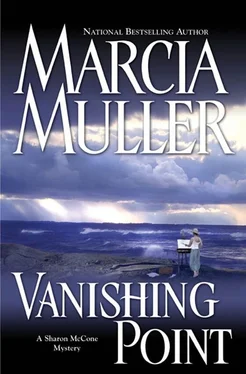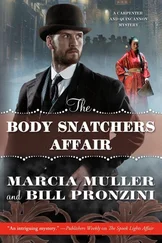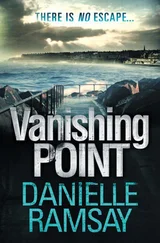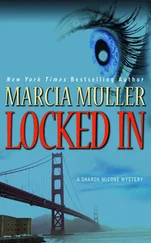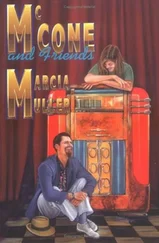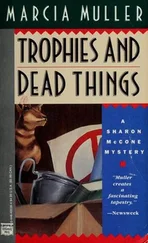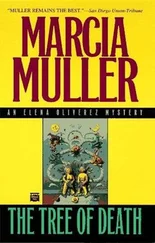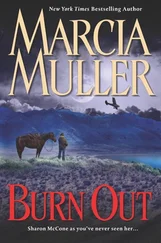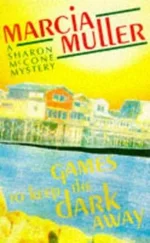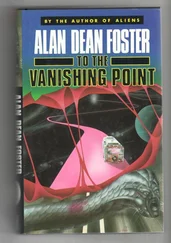Laurel Greenwood.
I remained where I was, taking in what she saw: the tops of the nearby tall pines and the brilliantly blue water beyond. An island, with more pines clinging to volcanic rock, sat midway between the shore and the stark outcroppings on the far side-remnants of the mountaintop that had been blown away by the ancient eruption. The lodge faced west, and already pink traces of the sunset were streaking the sky.
Laurel sat unmoving. A light breeze caught her hair and ruffled it around her shoulders; it was straighter than it had been at the time of her disappearance, but just as long, and silver-gray streaks caught the light. She had once been beautiful, but she was not anymore. And it wasn’t just the result of aging.
I watched her for a moment, but she seemed unaware of anyone else, barely aware of her surroundings. As I approached her, she seemed not to hear my footfalls.
I stopped two feet away from her. Put my hand on the.357 in the outer pocket of my bag, in spite of the unlikelihood that I’d need to show it. Said, “Laurel?”
Slowly she disengaged her gaze from the lake and looked toward me. I was reminded of the expression in her daughter Jennifer’s eyes when I’d approached her at the overlook north of Cayucos: remote, dazed. The same expression Jacob Ziff had described on Laurel’s face when he’d encountered her there.
As if she were waking up from a dream, or maybe as if I were pulling her back from some other world she’d been inhabiting.
Well, by now Laurel had been inhabiting that other world for a long time. Too long.
She stared blankly at me, and when she didn’t respond I said, “Laurel Greenwood?”
Suddenly her eyes came alive, displaying a rapid succession of emotions: bewilderment, disbelief, fear, and-finally-resignation. I waited out her silence.
“Who are you?” she finally said.
I took my hand off my gun and pulled up a nearby rocking chair; sat and handed her my card. At the same time I switched on the voice-activated tape recorder I’d earlier placed in the pocket of my light jacket.
I said, “Your daughter Jennifer Aldin hired me to find you.”
“I don’t have to talk with you,” Laurel said after studying the card I’d handed her.
“That’s true. I have no official capacity.”
“Good.” She started to rise from her chair.
I put my hand on her arm, looked her in the eyes. “Do you really want to turn your back on your daughter a second time? She still remembers you with love.”
After minor resistance, she settled down. “How much do you know about me?”
“Nearly everything.”
“Then what do you want?”
“To fill in the gaps so Jennifer will finally have peace of mind.”
“If I agree, will you go away and not bother me again?”
It troubled me that she hadn’t asked a single question about Jennifer or Terry. There was a coldness in the woman, an almost robotic quality, perhaps the product of living a reclusive life or-worse-of her basic nature.
I said, “No, I won’t bother you again.”
Emphasis on the first-person singular. Throughout most of my investigation I’d tried to understand why Laurel Greenwood had caused such ruin to the people she supposedly loved, and I’d hoped for Jennifer and Terry’s sake that my search would have a happy ending. Even before I’d come face-to-face with Laurel, I knew there would be no such ending, and that I would be legally bound to turn over everything I knew about her wrongdoings to the proper authorities. Seeing her in the flesh cemented that resolve.
“All right,” she said after a moment. “I’ll tell you my story from the beginning. And then you’ll go away and let me be.”
Laurel and I talked for more than two hours, and I recorded it all. She was alternately defensive, petulant, angry, and defiant. But eventually she confirmed most of what I’d already surmised. Reinforced my initial negative reaction to her as well.
“Josie was in the terminal stages of her illness, and at times she barely knew who she was. But at others, she was lucid, and completely herself. I’d always known she could be cruel; I’d seen her nastiness directed at others plenty of times. But until that afternoon, she’d never directed it at me.”
“She taunted you about her affair with your husband?”
“Yes.”
“And you shoved her down the stairs?”
“No! I would never have done that. I made a move as if to slap her. She ducked, and fell. By the time I got to the bottom of the stairs, she was dead.”
“But you didn’t call for the police or an ambulance right away. Why not?”
“What a question! I was in shock. And, I admit, afraid for my own skin. Wouldn’t you be?”
“After Josie died, I couldn’t stand to be around Roy. Didn’t want him to touch me. And I couldn’t deal with Sally, because I knew she probably suspected what had happened. And my little girls… I never wanted to be a mother. Roy forced that on me.”
“You didn’t love them at all?”
“God, don’t look at me like that! I loved them in my way. I was a good mother. A good mother. That’s why, after the accident with Josie, I was afraid I’d somehow contaminate them. I decided everyone would be better off without me.”
“So you planned your disappearance for a long time?”
“Yes. And it was a solid plan; it worked like a charm. With the money from Josie’s estate I bought a van, stored it at a facility in Morro Bay. I wore a red wig so if they asked for my identification I could pass for Josie. Later I had my own picture put on her driver’s license. And then, after a trip to Cayucos to paint one last canvas, I took off.”
“Do you still paint?”
“No. I gave it up that day. I’d read about how to disappear. If I was to make a new life, I had to give up everything from the old. I left my VW bus with the canvas and all my painting supplies in a public parking lot in Morro Bay, put on the wig in the restroom, so the people at the self-storage place wouldn’t think a stranger was taking the van. Then I walked up the hill, and drove away from there.”
“And never looked back.”
“Oh, I’ve looked back. Believe me, I have.”
“Santa Rosa was just a temporary stopping point. It looked like a nice place, the hospital was hiring, and it was far enough away that I didn’t think I’d run into anyone who might recognize me. But I didn’t like the summer heat there-too much like Paso Robles-and then I heard that Sutter Coast Hospital in Crescent City was opening its new facility and hiring. I loved Crescent City. Cool and gray a lot of the time, like the coastal areas down south. And I wasn’t so lonely. I made a friend there.”
“Debra Jansen.”
“You talked with her?”
“She told me you were in Klamath Falls.”
“How…? Oh, the Christmas card I sent her. A stupid, sentimental gesture. Probably the last I ever made. And since that’s how you found me, the worst. Trouble was, it was the Christmas season, and I was depressed. I had good reason to be.”
“Because of what happened a year before to Bruce Collingsworth?”
“… You have done your homework, damn you.”
“Debra Jansen says his death was an honest mistake. That during the confusion in the ER you started an IV with the wrong bag of solution.”
“That’s the truth. I grabbed a bag out of the wrong cabinet.”
“But it wasn’t the usual ER confusion that rattled you.”
“Have you ever worked on an ER? Even a good nurse like I was-”
“Come on, Laurel. You couldn’t have helped but recognize Collingsworth. What really happened?”
“A mistake! That’s all-a mistake! Bruce was in terrible pain, but conscious. We were stabilizing him, and he looked up and recognized me. He said, ‘Laurel, you’re alive.’ That’s what threw me.”
Читать дальше
